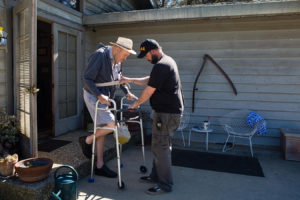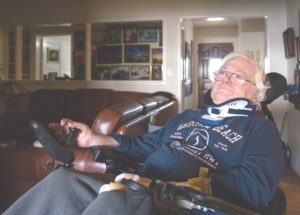Last month’s budget deal means Medicare beneficiaries are eligible for physical and occupational therapy indefinitely. Plus, prescription drug costs will fall for more seniors.
By Susan Jaffe | Kaiser Health News | March 14, 2018 | This KHN story also ran on 
Physical therapy helps Leon Beers, 73, get out of bed in the morning and

Leon Beers gets help from caregiver Timothy Wehe. (Bert Johnson for KHN)
maneuver around his home using his walker. Other treatment strengthens his throat muscles so that he can communicate and swallow food, said his sister Karen Morse. But in mid-January, his home health care agency told Morse it could no longer provide these services because he had used all his therapy benefits allowed under Medicare for the year.
… Under a recent change in federal law, people who qualify for Medicare’s [physical, occupational and speech] therapy services will no longer lose them solely because they used too much.
“It is a great idea,” said Beers. “It will help me get back to walking.” [Continued at Kaiser Health News, NPR and The Washington Post]
…

 A disabled senior with serious health problems who successfully challenged Medicare for denying her home health care coverage has racked up another win against the government.
A disabled senior with serious health problems who successfully challenged Medicare for denying her home health care coverage has racked up another win against the government. “I’m very pleased. It makes me feel America is still in good shape.”
“I’m very pleased. It makes me feel America is still in good shape.”  “It has been standard operating procedure that patients will be discontinued from therapy services because they are not improving,” she said.
“It has been standard operating procedure that patients will be discontinued from therapy services because they are not improving,” she said.

 man Services Secretary Kathleen Sebelius. In January, a federal judge approved a settlement in which the government agreed that this “improvement standard” is not necessary to receive coverage.
man Services Secretary Kathleen Sebelius. In January, a federal judge approved a settlement in which the government agreed that this “improvement standard” is not necessary to receive coverage. But officials looking for ways to cut the federal deficit are suggesting that these Medigap policies help explain why the government’s Medicare bill is rising so fast. If these private policies were less generous, they figure, seniors might reduce their trips to the doctor or find cheaper care, which in turn would save the government money.Fisher, 86, a cancer survivor from Gaithersburg who has had two hip replacements, says that strategy could backfire… [Continued on
But officials looking for ways to cut the federal deficit are suggesting that these Medigap policies help explain why the government’s Medicare bill is rising so fast. If these private policies were less generous, they figure, seniors might reduce their trips to the doctor or find cheaper care, which in turn would save the government money.Fisher, 86, a cancer survivor from Gaithersburg who has had two hip replacements, says that strategy could backfire… [Continued on 